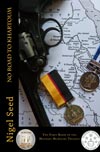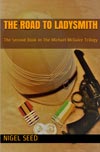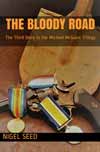

Michael McGuire is a Captain in the Royal Irish Fusiliers, stationed in Cairo in 1898. He didn’t start out that way. He was arrested in his native Dublin for stealing a loaf of bread to feed his starving mother and sister. Found guilty he was given the choice of the “Queen’s Hard Bargain”, go to prison or join the army. McGuire chose the army and joined the Grenadier Guards in Dublin Castle as a private. He found that he liked the life and became a useful soldier. He was selected to join the Gordon Relief Expedition to march to the relief of Khartoum.
For his courage during that campaign he was rewarded with a field commission and joined the Royal Irish Fusiliers, to be close to the woman he rescued from the Dervishes in the deserts of the Sudan. As he joined his new regiment he was tasked with forming a small group of men to be the advance eyes of the regiment when it was on the move.
His Reconnaissance team came to the notice of the Headquarters in Cairo and he and they were used for some deep penetration tasks to gather intelligence in the Sudan. When the reconquest of the Sudan began, McGuire was ordered to increase the size of his small unit to become the Reconnaissance Troop working directly with the head of intelligence.
He and his troop rapidly became very valuable to General Herbert Kitchener during this war and he was promoted to Captain and awarded the DSO. He and his men took part in most of the battles of that campaign including the massive battle of Omdurman, after which he was sent home to his wife in Cairo to nurse his wounds and to recover from the arduous soldiering.
After recovering from the bullet wound he sustained at the battle of Omdurman, Captain Michael McGuire was summoned back to his regiment, the Royal Irish Fusiliers and they were shipped south at short notice to South Africa. The British Government had been in dispute with the two Boer republics and troops were needed as a show of strength, to ensure that this ‘bunch of farmers’ did not get any expansionist ideas. The regiment landed to find that war had been declared and they were needed at Ladysmith urgently.
The army was mishandled and was trapped in Ladysmith with the Boers surrounding the town. McGuire and his men were outside the perimeter and joined up with the main army south of the Tugela River.
McGuire and his troop fought with the army under General Redvers Buller as he attempted to lift the siege of Ladysmith. They were deployed to carry out deep reconnaissance tasks sometimes behind Boer lines. After the debacle at Spion Kop Ladysmith was relieved and General Kitchener ordered that McGuire and his troop moved to the eastern army to operate under his direct control.
McGuire was promoted to Major and told to raise a company based on the training style he used to build the troop. The company fought on to the end of the war and was then dispersed again to return to peacetime soldiering. However, the war had changed McGuire and he was no longer comfortable in the Army.

Michael McGuire is forced into the Army because he stole bread for his starving family.
From the filthy back streets of Dublin to the deserts of the Sudan to fight and die for the British Empire.
The first book in the Michael McGuire Trilogy

Michael McGuire travels to South Africa to protect the British Empire.
Only just recovered from his wounds Captain McGuire must now sail south to the confusion and error of the Boer War.
The second book in the Michael McGuire Trilogy

The First World War send Michael McGuire from Gallipoli to the western front.
Michael McGuire has left the army, but as the First World War breaks out his country calls him again.
The third book in the Michael McGuire Trilogy